What you need to know about WhatsApp security settings
WhatsApp boasts more than 1.5 billion active users worldwide, making it one of the most popular applications on many platforms, including iOS and Android. These numbers are quite impressive, but also make users naturally worried about privacy. This is completely grounded, because WhatsApp is owned by Facebook, the company has a lot of scandals related to security issues.
So what does WhatsApp collect? Did WhatsApp follow you? And how can you tighten your security on this SMS application?
WhatsApp security settings - Things you may not know yet
- What does WhatsApp collect?
- Does WhatsApp share your data?
- Does WhatsApp store messages?
- Learn about the 'About' section in WhatsApp
- Does WhatsApp track your location?
- What does Status mean on WhatsApp?
- What does 'My Contacts' mean on WhatsApp?
- How to change privacy settings in WhatsApp
What does WhatsApp collect?
WhatsApp collects initial information that users provide to use it, including names, phone numbers, email addresses and even contacts. These are the necessary things to use the service.
Data usage is also collected to calculate the data. These data include performance logs, such as how often you log in and how often.

Remember: WhatsApp is a business, so WhatsApp will use this information (for example, 58% of users access the application many times a day) to improve the application and promote its own success. .
These are also the reasons why WhatsApp 'absorbs' data about the device you use, such as the model, operating system, battery level and version of the application you are running, as well as connection details such as home Network operator, IP address and signal strength.
The WhatsApp website also collects information through persistent cookies (cookies are stored until the user actively deletes) and session cookies (cookies stored in the clipboard). Persistent cookies help pages load faster if you come back in the future, and session cookies are deleted after you turn off your browser.
Does WhatsApp share your data?
In some cases, WhatsApp will share user information, although of course, only limited to the data collected above. WhatsApp claims that it is a complete service, including marketing, security and customization.
WhatsApp allows ads to appear. However, they are used by businesses and some of them can access your contact details. These companies can send you receipts, delivery information and reminders. WhatsApp then provides feedback analysis, which helps these companies better understand media effectiveness.
You may note that the amount of data collected has increased, especially since Facebook acquired WhatsApp.
WhatsApp is part of the Facebook family, meaning that data is shared between this SMS application and its parent company. Information gathered from WhatsApp is not publicly available, instead, they are added to Facebook's hidden profile about you. This is still one of WhatsApp's biggest security concerns.
This does not mean that other services do not collect your information. For example, Google logs the application through the Web and App Activity feature , so if you use Android, you don't just have to worry about WhatsApp (of course, only if you enable the Web feature and App Activity).
Does WhatsApp store messages?
No, WhatsApp usually doesn't keep your message. This is a big plus and is what users expect from an application like this.
WhatsApp uses encryption to send messages between devices, via WhatsApp servers. When the message is sent, it is automatically deleted from the WhatsApp server. Information deleted from the server includes chats, photos, videos, voice messages, files and location information you share with contacts.
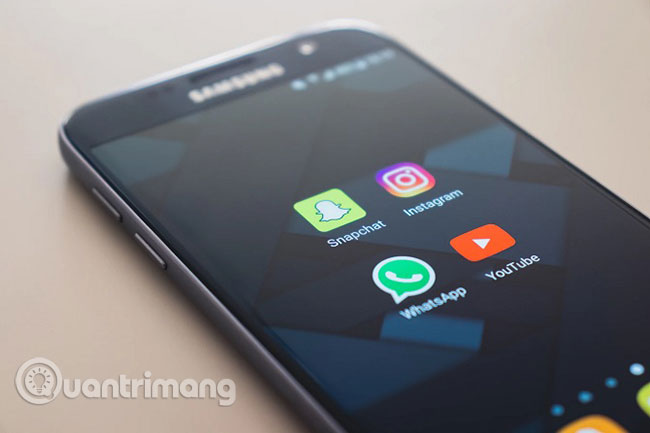
Encryption ensures that only you and the person you are sending can read the message. WhatsApp and third parties also cannot know what content you exchange. Therefore, the security concern lies in the device itself, which stores your conversation history.
However, the message may sometimes remain on the WhatsApp server if not sent. After 30 days, WhatsApp will delete them.
Why is a message not sent? This happens if you or the recipient is offline for a long time, you are blocked (this is a rare case) or if the recipient no longer uses WhatsApp).
Learn about the 'About' section in WhatsApp
You may notice that WhatsApp has a section named 'About'. But is this a privacy concern? Because in the end, you don't want too much personal information to be revealed.
Do not be afraid, this section does not contain sensitive data. It only contains short messages that other users can see under your name. Some people write a joke or a quote to let others know they have added the correct contact number. However, in most cases, it makes sense to inform people that you are using WhatsApp. Very few users change this.
But if you want to change, click Settings at the bottom right of the screen, then click on your name. Click on the About section . You are provided with many options, including Busy, Battery about to die and In a meeting . You can find the options in the 'Currently Set To' section . Click on that message and replace it with whatever you want.
The article will cover how you can hide the 'About' section from others in the following section.
Does WhatsApp track your location?
Yes, sometimes WhatsApp can access your location, but sharing is up to you.
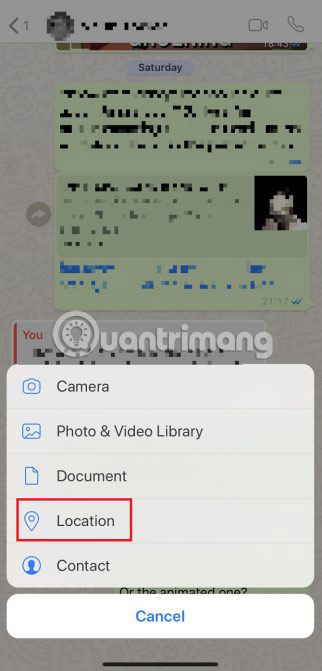
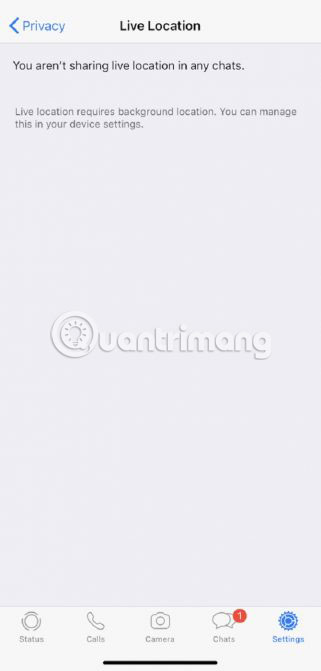
You can share your location with contacts, as long as you allow WhatsApp to access the location in the phone settings. Just select a conversation and click the (+) button in the message field, then select Location.
If you are worried that a contact may know your real-time location, go to Settings> Account> Privacy> Live Location . Ideally, set this option to 'None', otherwise you can turn this feature off from the remaining conversations.
As with standard messages, location information is end-to-end encrypted, so third parties (including cyber criminals) cannot read it.
But WhatsApp does. This information is used for the purpose of diagnosing and troubleshooting, when you have problems with location-based services.
WhatsApp can also determine your location based on IP address, GPS, Bluetooth and WiFi access points.
What does Status mean on WhatsApp?
Before finding out what contacts can see what information, you need to know what 'Status' means in WhatsApp.
You can find 'Status' at the bottom left of the application interface.
Status is a message that disappears after 24 hours. You can add text, including links or image content (including photos or videos). You may want to let your contacts know that you cannot access WiFi in the next few days. In this case, this is a great tool.
This feature is similar to My Story on Snapchat. In fact, Mark Zuckerberg claims that Instagram and WhatsApp (both owned by Facebook) are the two most popular story sharing services.
What does 'My Contacts' mean on WhatsApp?
Some details can be viewed by people you don't add to your contacts, so they can check if you make friends with the right people, in case someone is looking for you. That is the whole meaning of 'Everyone'. But you can change this to 'My Contacts'.
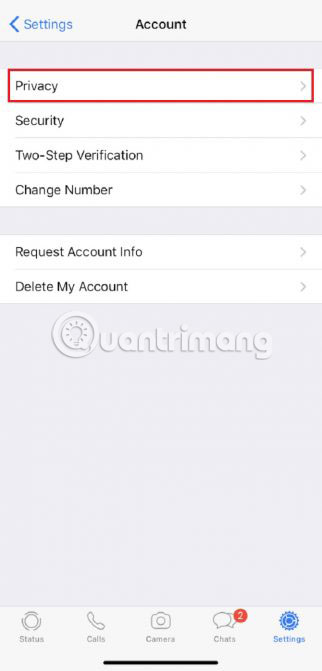
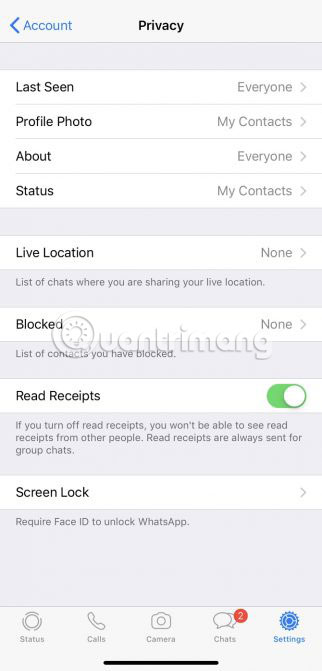
You can change most settings to 'My Contacts' or 'Nobody' . However, Status also gives you other options:
- My Contacts : This allows everyone in your contacts to see your 24-hour status.
- My Contacts Except : Click the arrow to access your contacts and select the people you want to hide your updates.
- Only Share With : This is basically the opposite of 'My Contacts Except' . Instead of blocking some users from seeing your status, this allows you to select only individuals who can view your status.
The above three options apply to Status. Contacts can still provide your referral information, etc., unless you also change these settings.
How to change privacy settings in WhatsApp
If you want to tighten security in the app, go to Settings> Account> Privacy . A lot of options are available for you.
Notably, you can change who can view your profile picture, About and Status messages. Of course, there will be certain consequences. If you hide 'Last Seen', it means your friends can't know when you last used WhatsApp and they are the same. In fact, if you want this level of privacy, don't expect others not to do the same.
If you're still worried, find out more about WhatsApp's privacy policy at:
https://www.whatsapp.com/legal/#privacy-policy Fortunately, very easy to use WhatsApp and maintain your privacy. Refer to more articles: 8 tips to enhance security for WhatsApp for more details.